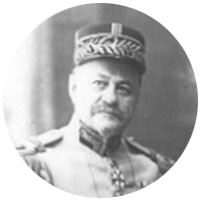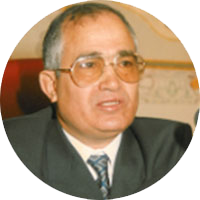Organization history

Founder of the Association of « Geneva Zones » in Paris, on 28 May 1931.
The origin of ICDO dates back to 1931. It was in Paris that the French Surgeon-General George Saint-Paul founded the Association of "Geneva Zones", from which the present International Civil Defence Organisation originated.
After the war of 1914-1918, Saint-Paul remained marked by the atrocity and cruelty that the population had suffered.
This gave him the idea to create safety areas, or neutralized zones, where civilians, in particular women, children, the elderly and the infirm, could seek refuge in times of war.
Soon after its creation, the membership of the Association grew to 5,000, including men and women of all backgrounds, life conditions, views and religions. This was considered a big success at the time!
In June 1935, the French Parliament recognized the Association. In 1936, in line with its mandate to work for the humanization of armed conflict, the Association launched a call for the establishment of areas of refuge for the population during the Spanish Civil War, the Sino-Japanese War (1937) and later in France during the Second World War.

Founder of the International Association of « Geneva Zones » International Association for the Protection of Civilian populations, Historical and Artistic Monuments in Wartime or armed conflicts » 1st Secretary General of the International Association of « Geneva Zones »
In 1937, the year of the death of George St’. Paul, the association of Paris became the main branch of the organization, renamed « International Association of Ge’neva Zones » by Henry George with its Headquarters in Geneva, and Henry George as its first Secretary general’. The International Association had the mission to reach several goals: the protection of civilian populations and h’istorical monuments in Wartime or Armed Conflicts, with affiliations in various European countries.

Secretary General of the International Association of « Geneva Zones »
1951 – 1958
Secretary General of the International Civil Defence Organisation I.C.D.O.
(non-governmental)
1958 – 1972
Secretary General of the International Civil Defence Organisation I.C.D.O.
(intergovernmental)
1972 – 1986
At the death of Henry George in 1951, Milan Bodi succeed him for 35 years. In 1958, the Association of Geneva Zones was transformed into a non-governmental organization known as the International Civil Defence Organization – ICDO, to which began to join governments.
In October 1966, governmental delegations met in Constituent Assembly and adopted the new constitution which came into force on 1 March 1972 granting the status of the ICDO an intergovernmental institution.

Secretary-General of the International Civil Defence Organisation (ICDO)
Commander of the International Order of Civil Defence.
In 1987, Sadok Znaidi was elected as the 3rd Secretary General of the ICDO. During 16 years, he worked on the development of the Organization.

Secretary-General of the International Civil Defence Organisation
Commander of the International Order of Civil Defence Officer
of the Order of Merit of Senegal – the Order of the Lion.
In 2003, Nawaf Al-Sleibi was elected as Secretary-General. Until 2013, he worked to guarantee the financial security of the ICDO and the development of the humanitarian projects.

Secretary-General of the International Civil Defence Organisation
Commander of the International Order of Civil Defence Officer
of the Order of Merit of Senegal – the Order of the Lion.
Dr. Vladimir Kuvshinov was appointed Secretary-General of the International Civil Defence Organisation by unanimous vote during the 21st session of the ICDO General Assembly, from 24-25 April 2014 in Geneva.
Dr. Kuvshinov previously served as Deputy Secretary-General of the International Civil Defence Organisation.
Before joining the ICDO, as of 1993, Dr. Kuvshinov worked for the Ministry of the Russian Federation for Civil Defence, Emergency and Elimination of Consequences of Natural Disasters (EMERCOM of Russia), where he served as Deputy Director of the Department for International Cooperation.
In 2005, Dr. Kuvshinov was appointed Counsellor at the Permanent Representation of the Russian Federation to the European Communities and Representative of the EMERCOM of Russia to the European Communities.
Dr. Kuvshinov has a vast experience in humanitarian operations, including search and rescue, humanitarian aid, forest fire combat, demining, development, reconstruction, and rehabilitation.
The "Association des Lieux de Genève" is founded in Paris by the French Surgeon-General Georges Saint-Paul. Its aim is to create neutralized zones or open towns in which some categories of the civilian population (women, children, the infirm and the elderly) could seek refuge during wartime. It also aims to protect historical monuments and cultural assets.
The "Association des Lieux de Genève" is recognized by the French Chamber of Deputies.
At the request of Saint-Paul, the "Association internationale des Lieux de Genève" (Lieux de Genève International Association) is transferred to Geneva and becomes "The International Association for the Protection of Civilian Populations and Historic Buildings in Wartime".
On the initiative of the Government of Switzerland, a Diplomatic Conference is convened. During this Conference, three Geneva Conventions are revised and the fourth - relative to the protection of civilian persons in time of war - is adopted and signed. The new Fourth Convention envisages safety zones and localities for the civilian population.
1st International Conference of the Association of Geneva Zones, Berlin (21-23 June).
2nd International Congress of the Association of Geneva Zones, Florence (10-13 January).
The International Association of Geneva Zones becomes the International Civil Defence Organisation (ICDO) and is given new status as a non-governmental organisation with the following objectives:
- establishing liaison between national civil defence organisations;
- undertaking and promoting studies and research on population protection matters;
- facilitating the exchange of experience and the coordination of efforts in the area of disaster prevention, preparedness and intervention.
In the same year, the ICDO Executive Committee creates the International Centre of Radioactive Alert in Geneva. The aim of the Centre is to promote and coordinate the international system of radioactive alert for the benefit of civil defence.
3rd International Civil Defence Conference, Geneva (12-16 May).
Theme: ”Prevention and Protection against Radioactivity”
4th International Civil Defence Conference, Montreux (16-18 October). Theme: "Co-operating among all civil defence organizations all over the world".
5th International Civil Defence Conference, Geneva (27 May-1 June). Theme: "Rescue work in case of disaster and war".
On 17 October, following the Second International Civil Defence Symposium on Nuclear Radiation Hazards in the Principality of Monaco (10-22 October), the representatives of the Member States present at the ICDO Constituent Assembly, adopt the text of the present Constitution.
The Constitution enters into force on 1 March 1972. It attributes the status of intergovernmental organization to the ICDO (United Nations, Treaty Series, volume 985, registration No. 14376). 6th World Civil Defence Conference, Geneva (22-29 February). Theme: "Disaster preparedness and mutual aid".
7th World Civil Defence Conference, Caracas (13-16 February). Theme: “Problems of intervention and interregional assistance”.
On 10 March, a headquarters agreement is signed between the Swiss Federal Council and the ICDO to govern the legal status of the Organisation in Switzerland.
The Diplomatic Conference, which takes place in Geneva on 8 June, adopts the Protocol Additional to the Geneva Conventions of 12 August 1949, relating to the Protection of Victims of International Armed Conflicts (Protocol I). Its article 61(a) provides the definition of the term “Civil Defence” : “ ’civil defence’ means the performance of some or all of the … humanitarian tasks intended to protect the civilian population against the dangers [of hostilities or disasters], and to help it to recover from the immediate effects of hostilities or disasters and also to provide the conditions necessary for its survival.”
On 7 December, the Protocol Additional to the Geneva Conventions of 12 August 1949, relating to the Protection of Victims of International Armed Conflicts (Protocol I) enters into force. 8th World Civil Defence Conference, Tunis (18-23 May). Theme: “Organization of a national civil defence system”.
9th World Civil Defence Conference, Rabat (5-11 November). Theme: “Concerted and coordinated actions in the fields of prevention, disaster preparedness and intervention”.
Adoption of the Universal Declaration on Civil Protection, by the 10th World Conference on Civil Protection, Amman, Jordan, (3-5 April). The Declaration calls on Governments: a) to consider emergency prevention and preparedness as an integral part and an important aspect of development policy and strategies, and hence to integrate them in the socio-economic planning at all in-country levels; b) to consider that the very concept as well as the definition of "Civil Defence" provided in article 61 of the Additional Protocol I of 8 June 1977 to the Geneva Conventions of 1949 should be enlarged outside armed conflicts and no longer limited only to certain humanitarian tasks in case of disasters in a country in a situation of armed conflict, and to recognize that the concept of civil defence should be understood to encompass all humanitarian activities related to protecting the population, their property and environment against accidents and disasters of all kinds; c) to review and further strengthen the National civil defence structures in order to enable them to fully play their key role as overall coordinator of national efforts related to preparedness and response efforts; d) to create in countries which do not have a civil defence organization, such structures with the help of developed and developing countries through the International Civil Defence Organisation.
The 26th International Conference of the Red Cross and Red Crescent, in its resolution 2 A (j): “invites States party to Additional Protocol I to implement and disseminate the rules of the Protocol regarding civil defence and recommends that the International Committee of the Red Cross (ICRC), in collaboration with the International Civil Defence Organisation, encourage international cooperation in this field and the inclusion of this question in international meetings on international humanitarian law.”
Adoption by the ICDO of the international distinctive sign of civil defence (an equilateral blue triangle on an orange background) as stated in Annex I, chap. V, art. 66, para. 4, of the Protocol Additional to the Geneva Conventions of 12 August 1949 (Protocol I). Beijing Declaration, adopted by the 11th World Conference on Civil Protection (26-28 October): “World Action Plan for the Development of Civil Protection: “Protection and Assistance for All” in the face of disasters in the 21st century”.
Tunis Declaration adopted by the International Conference in Tunis (14-16 September): “Voluntary service within civil defence: an act of solidarity and citizenship”.
International Conference held in Geneva finalizes a Framework Convention on Civil Defence Assistance. The text is adopted on 22 May in Geneva. Geneva Declaration, adopted by the Ministerial Conference in Geneva (30 October– 1 November): “Civil defence, a tool for sustainable development”.
Declaration of the Ministers and Directors-General responsible for Civil Protection, Civil Defence, Civil Safety and the Management of Emergency Situations, adopted at the close of the 12th World Conference on Civil Defence held in Geneva (25-27 June): “Civil Defence, a tool for international solidarity against natural and man-made disasters in the 21st century.” 23 September 2001 – Entry into force of the Framework Convention on Civil Defence Assistance.
Dakar Declaration, adopted during a regional seminar (28–29 October): “Prospects for introduction of voluntary work in civil protection in Africa.” On 26 February 2002, in Geneva, in accordance with Article 102 of the United Nations Charter, the Framework Convention on Civil Defence Assistance is registered under the No. 38131 as a multilateral convention. The registration certificate issued in New York is No. 48525. On 4 October 2002, during the 15th session of the ICDO General Assembly, Brigadier General Nawaf AL SLEIBI is elected as Secretary-General, with a mandate of four years as of 1 January 2003.
Re-election of Nawaf B. Al Sleibi as Secretary-General, on 23 November 2006 in Geneva at the 17th session of the ICDO General Assembly, with a mandate of four years as of 1 January 2007.
Nawaf B. Al Sleibi re-elected for a 3rd mandate, on 1 November 2010 in Geneva at the 19th session of the ICDO General Assembly, with a mandate of four years as of 1 January 2011.
The International Civil Defence Organisation enters its 40th year as an intergovernmental organization with its headquarters in Geneva. On this occasion, a commemorative celebration is held on 1 March at the Hotel Vincci Lella Baya in Hammamet, Tunisia. Civil Defence Day is officially inaugurated by the International Civil Defence Organisation.
Declaration of Gabala, adopted by the 13th International Conference on Civil Protection and Civil Defence, in Gabala, Azerbajian (12-13 March).
On 24 April 2014, the ICDO General Assembly (21st session) unanimously approves the nomination of Dr. Vladimir Kuvshinov as Secretary-General of the ICDO for a mandate of four years (2015-2018)
On 27 March 2018, the ICDO General Assembly (23st session) unanimously approves the nomination of Dr. Vladimir Kuvshinov as Secretary-General of the ICDO for a mandate of six years (2018-2024)
On October 18, Colonel Belkacem Elketroussi is appointed as Interim Secretary General.
On 27 October 2020, the ICDO General Assembly unanimously approves the nomination of Mrs. Njoupouo YAP Mariatou as Secretary-General of the ICDO
On October 28, ICDO celebrates its 90th Anniversary.